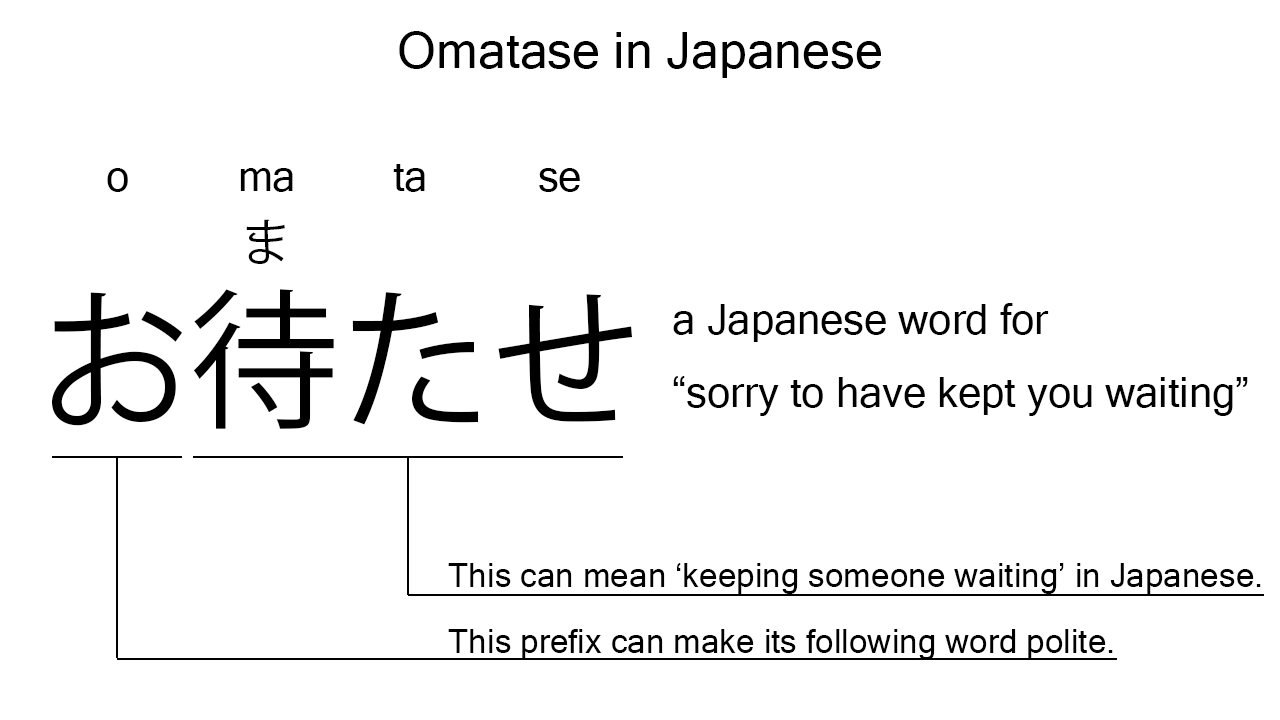What does “omatase” mean in Japanese?
Native speakers say “omatase” often to mean ‘sorry to have kept you waiting’ in Japanese. Perhaps, some Japanese learners know this word as it is sometimes used in Japanese movies, songs, novels, manga, anime, and the like. In this blog post, however, I will explain this word in detail based on its grammatical components. And also, I will explain how to use it through an example sentence. My explanations would help Japanese learners understand “omatase” more clearly. Then, let’s get started!
Contents
Definition and meanings of “omatase”
Let me start with the definition and meanings of “omatase”.
- omatase – お待たせ (おまたせ) : a word used to mean ‘sorry to have kept you waiting’, ‘thank you for waiting’, or such in Japanese.
Japanese native speakers use this word to express their apology or appreciation to someone who has been waiting for them. So, the usage is very similar to those of the English phrases like “sorry to have kept you waiting” and “thank you for waiting”.
The definition and meanings are not that difficult, I think. To understand this word more clearly, however, let me explain its grammatical components in detail, one by one.
What does “omatase” literally mean in Japanese?
“Omatase” consists of the following two components:
- o – お : a prefix making its following word polite.
- matase – 待たせ (またせ) : the stem part of the verb, “mataseru”, which means ‘to keep someone waiting’ in Japanese.
From these two components, we can understand that “omatase” is literally the polite expression which means ‘keeping someone waiting’ in Japanese. This literal interpretation is not completely in line with the actual meanings, but still understandable, I think. Japanese native speakers usually try to express their apology or appreciation to someone who has been waiting for them by saying “I kept you waiting for me,” for example.

When we meet new Japanese words, we should check their grammatical components in detail to understand their meanings clearly and deeply. In many cases, components tell us a lot about the meanings of the words they form. Actually, here, we could get the better understanding of “omatase” through the detailed check above.
So far, I’ve explained the definition and meanings of “omatase” together with its grammatical components. Then, let me explain how to use it through the example sentence below.
Example: how to say “sorry to have kept you waiting” in Japanese
「omatase」 to kanojo wa boku ni it ta – 「お待たせ」と彼女は僕に言った (「おまたせ」とかのじょはぼくにいった)
“Sorry to have kept you waiting,” she said to me.
Below are the new words used in the example sentence.
- to – と : a case particle working as a quote marker. In the example, this works after “omatase” to indicate what she said to the speaker.
- kanojo – 彼女 (かのじょ) : a pronoun meaning ‘she’ in Japanese.
- wa – は : a binding particle working as a case marker or topic marker. In the example, this works after “kanojo” to make the subject in the sentence.
- boku – 僕 (ぼく) : a pronoun meaning ‘I’ in Japanese. This is used mainly by boys and young males.
- ni – に : a case particle used to say in which direction an action goes. In the example, this is used after “boku” to say to whom she said.
- it – 言っ (いっ) : one conjugation of the verb, “iu“, which means ‘to say’, ‘to tell’, ‘to speak’, or such in Japanese. In the example, it has been conjugated for the better connection with its following word.
- ta – た : an auxiliary verb used after a verb, adjective, or auxiliary verb to make its past tense form. In the example, this is used after “it” to make its past tense form, “it ta”.
This is a typical usage of “omatase”. In this example, it works to mean ‘sorry to have kept you waiting’ in Japanese. When we want to express apology or appreciation in Japanese to someone who has been waiting for us, this word is a very good option.
Summary
In this blog post, I’ve explained the definition and meanings of “omatase” in detail based on its grammatical components. And also, I’ve explained how to use it through the example sentence. Let me summarize them as follows.
- omatase – お待たせ (おまたせ) : a word used to mean ‘sorry to have kept you waiting’, ‘thank you for waiting’, or such in Japanese. Japanese native speakers use this word to express their apology or appreciation to someone who has been waiting for them. So, the usage is very similar to those of the English phrases like “sorry to have kept you waiting” and “thank you for waiting”. This word is literally the polite expression which means ‘keeping someone waiting’ in Japanese. This literal interpretation is not completely in line with the actual meanings, but still understandable, I think. Japanese native speakers usually try to express their apology or appreciation to someone who has been waiting for them by saying “I kept you waiting for me,” for example.
Hope my explanations are understandable and helpful for Japanese learners.